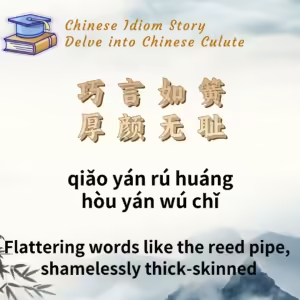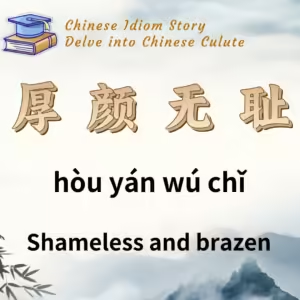
Chinese Idiom: 巧言如簧,厚颜无耻 (Qiao She Ru Huang, Hou Yan Wu Chi)
English Translation: Flattering words like the reed pipe, shamelessly thick-skinned
pīn yīn: qiǎo yán rú huáng, hòu yán wú chǐ
Idiom Meaning: This idiom is used to describe someone who uses flattering, deceitful words that sound pleasant but are insincere, while also being shameless and lacking any sense of embarrassment.
Historical Source: “Book of Songs” (《诗经》), specifically from the “Minor Odes of the Kingdom” (《小雅》) section, in the poem titled “Clever Words” (《巧言》).
Idiom Story:
The poem “Clever Words” was written during the Western Zhou Dynasty. It is a work that exposes the destructive behavior of malicious individuals who bring harm to the state through deceit and treachery. The author of the poem, possibly a victim of such actions, uses his observations to paint a vivid picture of the ugly conduct of these people and the damage they cause. He also points out that the reason these individuals are able to gain influence and act as they please is primarily because those in power “believe slander.”
The poem consists of six sections:
- The first section describes the author’s experience of being slandered and harmed.
- The second and third sections emphasize that the root cause of the author’s suffering is the trust that those in power place in slanderous words.
- The fourth section praises wise rulers who can distinguish right from wrong.
- The fifth section harshly criticizes the shamelessness of those who use flattering and deceitful words to advance their agendas.
- The sixth section points out that these slanderers have no real skills, only the ability to cause trouble.
The fifth section of the poem reads:
“Tender and pliable is the wood, which the gentleman carefully nurtures.
Beware of the ever-changing rumors, keeping them in mind.
Reckless and deceitful words flow from their mouths.
Clever words like the reed pipe, their shamelessness is clear.”
This section of the poem emphasizes that just as one must carefully nurture delicate wood, so too must a ruler be cautious of the ever-changing and unreliable rumors that circulate. The poem warns against the reckless and deceitful words that can easily emerge from someone’s mouth. It concludes by highlighting the danger of those who, with shamelessness, use flattering and deceitful words to manipulate and deceive others, comparing these words to the pleasing yet hollow sound of a reed pipe.
This metaphor serves as a powerful reminder to be vigilant against those who use sweet words to mask their true intentions, as their shamelessness and deceit can cause great harm.






